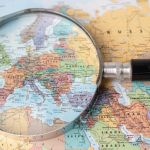Looking for new international opportunities for growth and development?
Virtual exchanges are now possible, but what are they?
Virtual exchanges in higher education and youth are online interpersonal interactions that foster cross-cultural communication and the growth of soft skills development.
Without physical mobility, they enable all young people to gain access to excellent formal and informal global and cross-cultural education. Participant organisations must arrange virtual exchanges for people in the 13-30 age range, which are always moderated by a certified facilitator and take place in small groups.
The specific objectives of this interesting call of the European Commission are the following:
- Encouraging intercultural dialogue with third countries not associated with the Programme and increasing tolerance through online people-to-people interactions.
- Promoting various types of virtual exchanges, allowing more young people to benefit from intercultural and international experience
- Enhancing critical thinking and media literacy, particularly in the use of the internet and social media
- Fostering the digital and soft skills development of students, young people and youth workers
- Promoting citizenship and the common values of freedom, tolerance, and non-discrimination through education
- Strengthening the youth dimension in the relations of the EU with third countries
To date, there are already 27 214 people who have had the great opportunity to grow personally and professionally thanks to participation in exchanges, dialogue facilitation, training, and exchanges related to the Virtual exchange program.
Some examples of possible activities
There is a variety of activities and topics possible depending on the type of project and target groups, but all projects are expected to have a learning dimension and to report on it.
Online facilitated discussions are, for example, activities part of youth projects, while on-line facilitates discussions are part of higher education courses.
Which regions of the world can participate?
Organisations from Eu member states or third countries associated with the programme can participate as coordinators, while organisations from the Western Balkans, Neighbourhood East, South-Mediterranean countries, Russian Federation, Sub-Saharan Africa can be partners.
An important eligibility criterion is the composition of the partnership, which expects the number of organizations from EU member states or third countries associated with the programme not to be higher than the number of organisations from third countries not associated with the programme.
CONCLUSIONS
So, if you are thinking about joining an ERASMUS+ project but feel like you are lacking the necessary competencies and experience, let’s establish a mutual partnership: we can include you in one of the projects we are designing but we can also support you in designing your own projects. Don’t miss this opportunity! Fill in this form!


